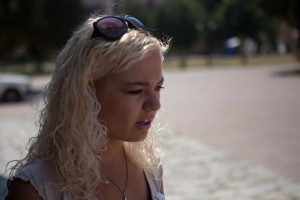 Today I hired an interpreter and went off in search of some records which I believed to exist in the town I am in now, Kamyanets – Podilsky, records of the people in the town of Khotin back in the mid/late 1800s. We got to the archives, Iryna and I, only to be told that the records we were looking for had been destroyed in a fire in 2003.
Today I hired an interpreter and went off in search of some records which I believed to exist in the town I am in now, Kamyanets – Podilsky, records of the people in the town of Khotin back in the mid/late 1800s. We got to the archives, Iryna and I, only to be told that the records we were looking for had been destroyed in a fire in 2003.  I had specific Opus/Folio numbers and when they looked them up, we found that they had not in fact been destroyed but had been moved to Khmelnitsky, some 100km away. The man in the office here was incredibly talkative though so it took us a little while to get out of there. Iryna called a driver she knew and we had about an hour to kill before he would be ready to take us the 100km. We went to a café and ran into her uncle
I had specific Opus/Folio numbers and when they looked them up, we found that they had not in fact been destroyed but had been moved to Khmelnitsky, some 100km away. The man in the office here was incredibly talkative though so it took us a little while to get out of there. Iryna called a driver she knew and we had about an hour to kill before he would be ready to take us the 100km. We went to a café and ran into her uncle  Victor and chatted some. She told him about what I was doing and how she was helping me and he soon flagged down a woman who had been the primary researcher for the Jewish Genealogical book for this area.
Victor and chatted some. She told him about what I was doing and how she was helping me and he soon flagged down a woman who had been the primary researcher for the Jewish Genealogical book for this area. 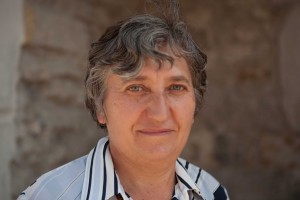 She took down the names of my family members that I was aware of and went on her merry way. If she comes up with something I’ll be hearing about it I’m sure. She told me the price would be steep, perhaps $100 for any information she might uncover, but if she finds something of interest, it would be worth it.
She took down the names of my family members that I was aware of and went on her merry way. If she comes up with something I’ll be hearing about it I’m sure. She told me the price would be steep, perhaps $100 for any information she might uncover, but if she finds something of interest, it would be worth it.
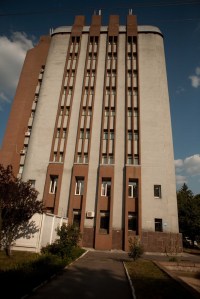 Anyway, away we went to Khmelnitsky (if you think it’s hard to read in English, you should try sounding it out in Cyrillic. Whoa-sky). We got there and the records were held in an utterly Soviet -style building. The guard inside was very stiff and unencouraging, but we made it past him with help of our passports and went up to the archives section where 5 never-smiling broad chested women women gave Iryna a hard time, but she held her own. They had told her that at best we could request the information and come back to see it the next day. Somehow we ended up in a room where they provided us with our requested folios and we were off and researching. Unfortunately while the information was accurate, it wasn’t what I had hoped it would be. For example, one had been listed on the web as being “Census” for Khotin for 1850. It turned out to be one instance of information about one person in Khotin rather than being a formal census document. What had promised to be property records for Khotin turns out to have simply been a single transfer between two parties. Birth, Death and Marriage records are available but not in that archive. Which archive? Maybe Chernivtsyi, maybe in Moldova,, maybe in Odessa, maybe elsewhere. There were so many different occupying forces over the recent history of the place that records have been moved a lot, and are also in different languages depending on the boss of the local registrar.
Anyway, away we went to Khmelnitsky (if you think it’s hard to read in English, you should try sounding it out in Cyrillic. Whoa-sky). We got there and the records were held in an utterly Soviet -style building. The guard inside was very stiff and unencouraging, but we made it past him with help of our passports and went up to the archives section where 5 never-smiling broad chested women women gave Iryna a hard time, but she held her own. They had told her that at best we could request the information and come back to see it the next day. Somehow we ended up in a room where they provided us with our requested folios and we were off and researching. Unfortunately while the information was accurate, it wasn’t what I had hoped it would be. For example, one had been listed on the web as being “Census” for Khotin for 1850. It turned out to be one instance of information about one person in Khotin rather than being a formal census document. What had promised to be property records for Khotin turns out to have simply been a single transfer between two parties. Birth, Death and Marriage records are available but not in that archive. Which archive? Maybe Chernivtsyi, maybe in Moldova,, maybe in Odessa, maybe elsewhere. There were so many different occupying forces over the recent history of the place that records have been moved a lot, and are also in different languages depending on the boss of the local registrar.
We heard an interesting story about how Lenin was ¼ Jewish and the Soviets didn’t want word getting out about that so they came to this archive many years ago (since his Jewish grandmother had come from there) and effectively erased a few people from the history books completely.
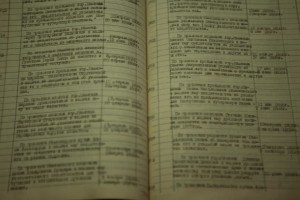 I flipped through an entire book spanning about 40 years of archive references looking for the Zeldman name but wasn’t successful in finding any references. Here’s what that book looked like!
I flipped through an entire book spanning about 40 years of archive references looking for the Zeldman name but wasn’t successful in finding any references. Here’s what that book looked like!
So off we went, not disheartened, just a little empty handed. In the lobby, there were various images and documents on display and this one caught my eye as it looks to me a lot like 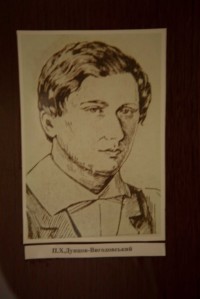 my father when he was younger. Tomorrow will be a bigger day really, for it will be the day that we go to Khotin. Iryna helped some people from England follow up on their Jewish roots in Khotin last year so she knows where the Jewish Cemetery is and some of the 23 Jewish people who still live there. She told me not to plan to find any house there than my family may have lived in since the Fascists in WWII pretty much destroyed things there. I’m very excited to walk again on Zeldman soil, and tomorrow will be the day. I’m going to spend the night there somewhere. I want to be able to have some time to simply wander the streets there, smell the flowers, taste the dirt, feel the sun and just get a sense of life there. Time with the Jewish community there will perhaps be the most important.
my father when he was younger. Tomorrow will be a bigger day really, for it will be the day that we go to Khotin. Iryna helped some people from England follow up on their Jewish roots in Khotin last year so she knows where the Jewish Cemetery is and some of the 23 Jewish people who still live there. She told me not to plan to find any house there than my family may have lived in since the Fascists in WWII pretty much destroyed things there. I’m very excited to walk again on Zeldman soil, and tomorrow will be the day. I’m going to spend the night there somewhere. I want to be able to have some time to simply wander the streets there, smell the flowers, taste the dirt, feel the sun and just get a sense of life there. Time with the Jewish community there will perhaps be the most important.
So not too much to report in a way, but it feels good to have tried, and it’s wonderful to be here.
